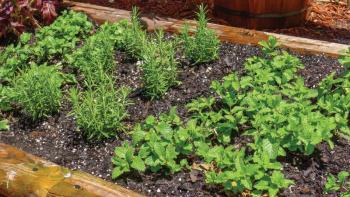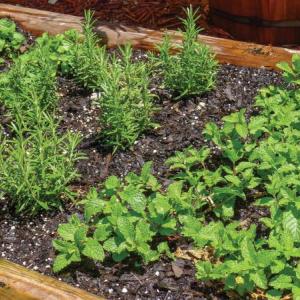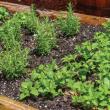Five medicinal plants to grow inside this fall
As we head into a fall still spiking with the COVID-19 virus, along with a time change and the results of an election that have still divided many people, it’s completely natural that feelings of tension, stress, exhaustion, and anxiety are high. We reached out to herbalist Katheryn Langelier, who has authored a soon-to-be-released book, Herbal Revolution (Macmillian, 2020), the eponymous title of her Union farm and apothecary. The book delves into 65 medicinal recipes that heal.
There are a number of ways to calm anxiety according to psychology experts, but one way to use your hands and focus on a meaningful activity is to start a medicinal herb garden. Here are four herbs and one succulent to improve your mood, body, and mind.
Aloe Vera
Aloe vera is a cactus-like succulent that produces a gel and latex.
“Aloe vera is a really fantastic topical plant,” said Langelier. “I love using it for rashes, burns, and sunburns. Coming into the fall, we’re washing our hands a lot, the air is dryer, so aloe is really soothing on chapped or cracked skin. With powerful antioxidants, aloe can also be taken internally and aloe juice can be soothing to the digestive tract.”
Thyme
Thyme is an herb and its flowers, leaves, and oil can all be used medicinally.
“Thyme is one of those ‘food is medicine plants’,” said Langelier. “It is antibacterial and antiviral, so it’s really great for this time of the year. Cooking with it, adding it to soup stocks, and adding it to roasted vegetables, will be very beneficial. I like to make an infused honey with thyme or a tea with thyme and fresh ginger, which helps with decongestion or sinus infections.”
Peppermint
Peppermint is a plant; the leaves and oil are used medicinally.
“Peppermint is used for digestive tracts; it’s a carminative, which helps with bloating and gas,” said Langelier. “It’s good for any digestive pain and can help decrease nausea. These are best used in teas as well.”
Lemon Balm
Lemon balm is an herb; the leaves are used medicinally.
“Lemon balm is an antiviral and is a fantastic herb for preventative care for the immune system,” said Langelier. “It’s great for the digestive system, helping with bloating and gas, but it’s also good for the nervous system. Lemon balm lifts our moods and reduces anxiety and stress. Again, I’d use this with tea, one of my favorites.”
Rosemary
Rosemary is an herb; the oil extracted from the leaves is used medicinally.
“Rosemary is also antiviral and antibacterial, so it’s a great one for the immune system,” said Langelier. “I like it for respiratory support and it’s great for our cerebral circulation. It’s a mild brain tonic as well. I’d use this in savory cooking, make infused honey, or into hot drinks.”
Tips for Planting
“The first thing you do is get seeds or cuttings and then put them in individual pots,” said Coco Hilt, Annuals Manager of Plants Unlimited in Rockport. “Peppermint especially goes crazy; it’s an aggressive plant so it has to be kept separate. You need to have good potting soil with nutrients— don’t just go out to your garden and scoop up what’s leftover from the summer. Because that soil is going to be compacted and the seedlings might get root rot. The aloe vera plant is a succulent, so it also could use a good cactus mix and should have plenty of drainage holes. As far as water, all of these plants like to be on the dry side. And the aloe vera will want to be even drier. Don’t fertilize too often; just every couple of months.”
Light in a month where Daylight Savings has cut back an hour and it starts to get dark by 4:30 p.m. is also tricky.
“You’re going to need at least six hours of direct light for these plants, so put them in a window with southern exposure,” said Hilt. “And if you don’t have that, use a grow light; you can get them at any plant or hardware store or online. I have my staple herbs in the basement, under a grow light and use a lot of them in my cooking—rosemary, parsley, basil and cilantro.”
For more information visit: https://www.plants-unlimited.com/
Kay Stephens can be reached at news@penbaypilot.com
Event Date
Address
United States




























